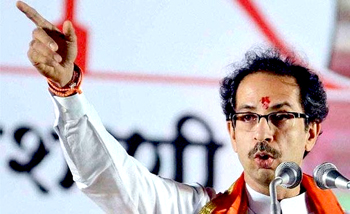Mumbai, Feb 26: Stepping up its resistance against the land acquisition law, the Shiv Sena today said it will fiercely oppose the bill and not commit the sin of "damaging" the interest of farmers at the cost of being in power.
 Calling it as a "draconian" law that will finish off the very existence of farmers, the BJP-ally in Maharashtra said the Government cannot budge an inch forward by "insulting" the struggle of farmers assembled at Jantar Mantar in Delhi under activist Anna Hazare's leadership.
Calling it as a "draconian" law that will finish off the very existence of farmers, the BJP-ally in Maharashtra said the Government cannot budge an inch forward by "insulting" the struggle of farmers assembled at Jantar Mantar in Delhi under activist Anna Hazare's leadership.
"The government has shocked everyone by bringing in the ordinance. Will oppose the (land acquisition) bill at any cost," Sena said in a editorial in the party mouthpiece Saamna.
Charging that the government was helping corporates acquire land of farmers, it said questions are being raised if the government is in the role of a (real) estate agent.
"Farmers are reeling under huge debt burden but instead of doing something on that front, if the government is bent on gobbling up their land, then the fire of discontent will spread," it said.
"We will not commit the sin of damaging interests of farmers at the cost of being in power," the party said.
Shiv Sena president Uddhav Thackeray had yesterday asked his party's workers to inform farmers in the state about the "ill effects" of the Land Acquisition Bill in the present format.
"People should know the stance we have taken. For this, Sena workers will propagate the ill effects (of the land acquisition ordinance) among farmers," senior Sena leader Subhash Desai had said, after Uddhav addressed a meeting of party functionaries here.
"Henceforth, (the government) will have to pay heed to others when it comes to important decisions. There is no question of making a U-turn on this issue," Desai, who is the state industry minister, had said.
Uddhav had on Tuesday said that there was no question of supporting any law that went against the interest of farmers, reminding BJP that farmers had brought it to power by placing their trust in the party.
"Do not commit the sin of squeezing the throat of the farmers," he had said, adding, the party wasn't opposed to economic development but could not allow it to take place through forced acquisition of land.
The government faced resistance from several corners yesterday as Congress took to streets in Delhi, while its own allies like Shiv Sena, Akali Dal and the LJP also voiced their strong concerns against the bill.
The Centre had issued the ordinance in December to exempt projects in defence, rural electrification, rural housing and industrial corridors from provisions of a law enacted by the previous Congress party government that mandated the consent of 80 per cent of affected landowners for any deal.
The controversial measure also ends the need for companies to conduct a social impact study of such projects, which would involve public hearings and, industry executives fear, that drag on for years.





Comments
Add new comment